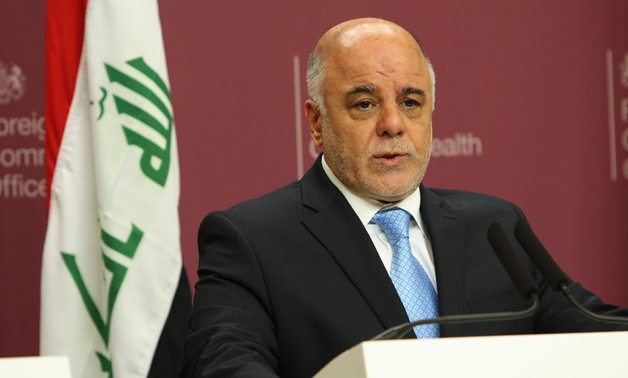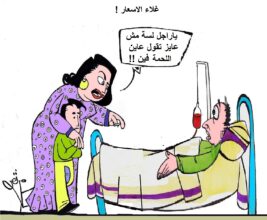Head of the Victory Coalition in Iraq, former Prime Minister Haider al-Abbadi, told Egypt Today Wednesday that Egypt is a strategic Arab center, noting that Iraq needs integration with Egypt not only economically, but also strategically.
Abbadi stressed that the Victory Coalition did not approve of or participate in Adel Abdul Mahdi Government in 2018, pointing out that the formation of that government was based on partisan consensus in violation of the constitution.
What are the most prominent challenges that threaten the security and stability of Iraq?
The biggest challenge is to reform the political system to provide a solid core for the state and good and effective governance that efficiently and fairly manages the country.
The disasters we suffer today, including the failure of the political process; corruption and dependence on foreign intervention; chaos; and the fragility of the social, economic and security structures enabled the elements of terrorism and crime to get out of the state’s control.
How do you evaluate the Egyptian-Iraqi relations? What does Iraq need from Cairo?
Egypt is a strategic Arab center, and the two countries need to integrate economically to create balance in the region.
I have communicated with the Egyptian officials my tenure more than any other country to build solid relations for the interests of our peoples and to achieve stability in the whole region.
Why did you refuse to participate in choosing the new government in Iraq?
The formation of this government violates the constitution and law. It is fragile and contradictory and cannot survive or manage the country efficiently.
Do you think that the Iraqi political system is threatened?
If the system is not reformed to be effective and efficient to solve political, economic and security challenges, it cannot survive.
What is the reason behind the Iraqi people’s state of dissatisfaction with the government?
The sectarian nature of the Iraqi political system was based on acquisition, hegemony, and interests, and linked Iraq to international regional hubs. This is in addition to the modest performance in development, administration, and state policies. All this did not satisfy the Iraqi people.
During your tenure as president of the Victory Government, why did you not deal decisively with the anti-corruption file?
The Victory Government ruled the state in 2014, and Iraq was exposed to an existential danger. I had priorities such as countering terrorism, saving the collapsed economy, and restoring the unity and sovereignty of the state. We succeeded due to the sacrifices made by the people.
We achieved what no other government could achieve. The government established the Supreme Council for Combating Corruption, eight ministers and hundreds of officials were referred to the judiciary, cooperation with Interpol was activated and officials were brought back to Iraq for trial. The question is: Have we succeeded completely? No, corruption needs, above all, a strong and effective judiciary. We had started walking in this direction and we were planning to complete this sacred mission.
Did any Iraqi party respond to your national initiative?
Since the launch of the Youth Movement last October, we have been aligned with the Iraqi people, and we have put forward comprehensive initiatives on October 4 to reform the system and meet the demands of the people. We did not witness a clear interaction with our proposals; therefore, we did not reach the stage of forming a reform and rescue front to deal with the crisis; the response to our national initiatives was late.
How do Iraqi institutions restore the trust of citizens?
By reforming the political system; this can only be achieved through actual steps that include activating the broad participation in the political life, implementing fair electoral laws, regulations and procedures, and also with the adoption of democracy.
Do you think that Iraq is a victim of regional and international conflicts?
Certainly, Iraq has been the biggest victim of international and regional conflicts for half a century, but the main responsibility rests upon the Iraqi forces and elite and the extent of their patriotism, wisdom and political skill to protect Iraq from the repercussions of these conflicts, and here lies the problem.
Who is behind the assassinations that took place during the recent demonstrations in the Iraqi streets?
The forces that consider themselves greater than the State.
Are there sectarian militias outside the authority of the Iraqi state?
Unfortunately, they are present, and these militias have no sect or political identity.
How do you respond to the accusations against Iraqi clerics in linking religion to politics?
The Iraqi Religious Center is represented by the Supreme Religious Authority which does not interfere in politics except to preserve national unity and achieve the aspirations of the people.
What are the reasons that delay the reconstruction process in Iraq?
Political instability, we need an effective state structure in order to advance the processes of reconstruction and comprehensive development.
Do the current conditions help ISIS to revive its purported caliphate?
The state’s division and loss of control will reflect negatively on the security, military and social performance. We warn against political division and stress that it is the shortest path to the return of terrorism.
Finally … Is Haider al-Abbadi American, Iranian, or Qatari?
I am Iraqi, and I am proud. The secret to my success in defeating terrorism and unifying the state is my patriotism. I did not prefer any interest to the interests of my country; these charges are cheap political competition.
Egypt Today















